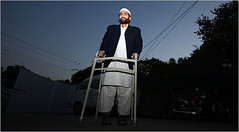
Victim of the so-called US "war on terror" who was held unjustly for six years and tortured. He is permanently disabled in Pakistan.
Originally uploaded by Pan-African News Wire File Photos
By LARA JAKES, Associated Press Writer
WASHINGTON – President Barack Obama will restart military tribunals for a small number of Guantanamo detainees, reviving a Bush-era trial system he once assailed as flawed but with new legal protections for terror suspects, U.S. officials said.
The changes to the system, which will affect a small number of detainees, will be announced Friday.
The military trials will remain frozen for another four months as the administration adjusts the legal system that is expected to try fewer than 20 of the 241 detainees at the U.S. naval detention center at Guantanamo Bay, Cuba. Thirteen detainees — including five charged with helping orchestrate the Sept. 11, 2001, attacks — are already in the tribunal system.
Two senior administration officials outlined several of the rules changes, which will be carried out by executive authority, to The Associated Press on Thursday night. They include:
_Restrictions on hearsay evidence that can be used in court against the detainees.
_A ban on all evidence obtained through cruel, inhuman or degrading treatment. This would include statements given from detainees who were subjected to waterboarding, a form of simulated drowning.
_Giving detainees greater leeway in choosing their own military counsel.
_Protecting detainees who refuse to testify from legal sanctions or other court prejudices.
The White House may seek additional changes to the military commissions law over the next 120 days, but it was not immediately clear Thursday what they could include. The two senior administration officials spoke on condition of anonymity because Obama had not yet announced the changes.
The tribunal system — set up after the military began sweeping detainees off the battlefields of Afghanistan in late 2001 — has been under repeated challenges from human rights and legal organizations because it denied defendants many of the rights they would be granted in a civilian courtroom.
In a statement late Thursday, Sen. Lindsey Graham, R-S.C., called Obama's decision to revamp and restart the tribunals a step toward strengthening U.S. detention policies that have been derided worldwide.
"I continue to believe it is in our own national security interests to separate ourselves from the past problems of Guantanamo," said Graham, who has been working with the administration on issues related to detainees. "I agree with the president and our military commanders that now is the time to start over and strengthen our detention policies. I applaud the president's actions today."
Graham was an Air Force lawyer and is a member of the Senate Armed Services Committee.
Yet the move by the new Democratic president is certain to face criticism from liberal groups, already stung by his decision Wednesday to try to block the court-ordered release of photos showing U.S. troops abusing prisoners in Iraq and Afghanistan. That decision marked a reversal of his earlier stand on making the photos public.
"It's disappointing that Obama is seeking to revive rather than end this failed experiment," said Jonathan Hafetz, a national security attorney at the American Civil Liberties Union. "There's no detainee at Guantanamo who cannot be tried and shouldn't be tried in the regular federal courts system. Even with the proposed modifications, this will not cure the commissions or provide them with legitimacy. This is perpetuating the Bush administration's misguided detention policy."
Critics of the Guantanamo commissions, including Obama as a senator in 2006, called them a violation of U.S. law because of the limits on detainees' legal rights. Pushed by President George W. Bush, Congress created the current tribunal system in 2006 after scrapping an earlier version that gave detainees additional rights.
Obama voted for the earlier version of the tribunals plan that also had the support of four moderate Republicans on the Senate Armed Services Committee. But he opposed the system that Congress ultimately approved, calling it "sloppy."
"We have rushed through a bill that stands a good chance of being challenged once again in the Supreme Court," Obama said in a Sept. 28, 2006, speech on the Senate floor. "This is not how a serious administration would approach the problem of terrorism."
Later, on the presidential campaign trail in February 2008, Obama described the Guantanamo trials as "a flawed military commission system that has failed to convict anyone of a terrorist act since the 9/11 attacks and that has been embroiled in legal challenges."
Three Guantanamo detainees have been convicted in the tribunals so far, a government official said Thursday.
The restrictions on evidence almost certainly will result in only a fraction of detainees who ever will go to trial. The rest of the detainees would either be released, transferred to other nations or tried by civilian prosecutors in U.S. federal courts, an official said.
It's also possible that some could continue to be held indefinitely as prisoners of war with full Geneva Conventions protections, according to another senior U.S. official.
The decision to restart the process puts the administration in a race against the clock to conclude commission trials before the Navy prison is closed, by January 2010. If the trials are still going on, the detainees might have to be brought to the United States, where they would receive even greater legal rights.
Since Obama's executive order to close the prison, Republicans have focused on the issue of where the detainees would go — and the new Democratic administration's lack of a plan to deal with them. In his Thursday statement, Graham said he would not support allowing detainees to be released into the United States.
No comments:
Post a Comment